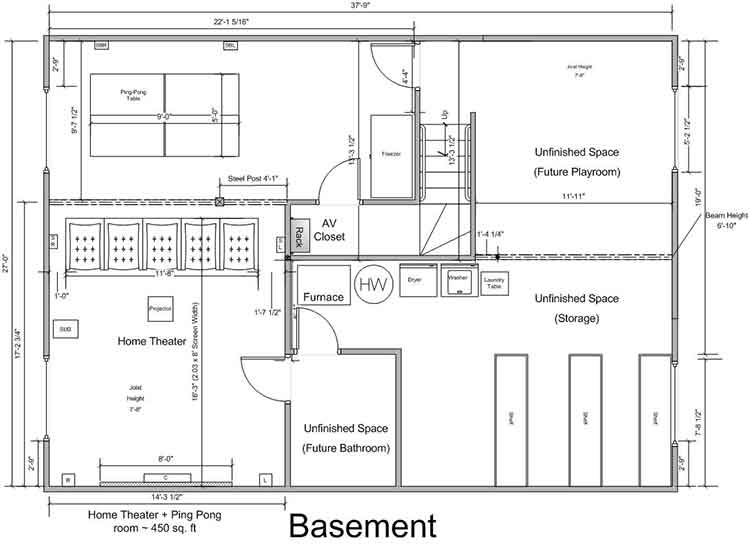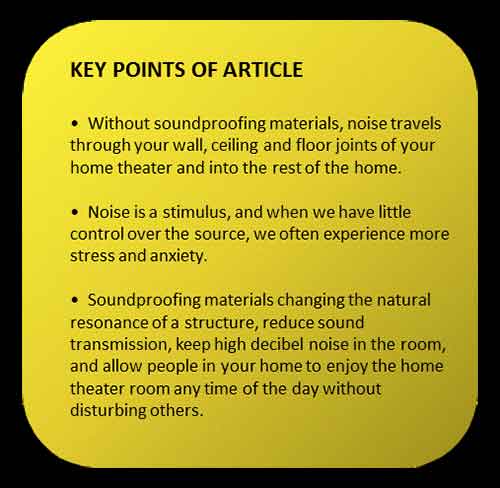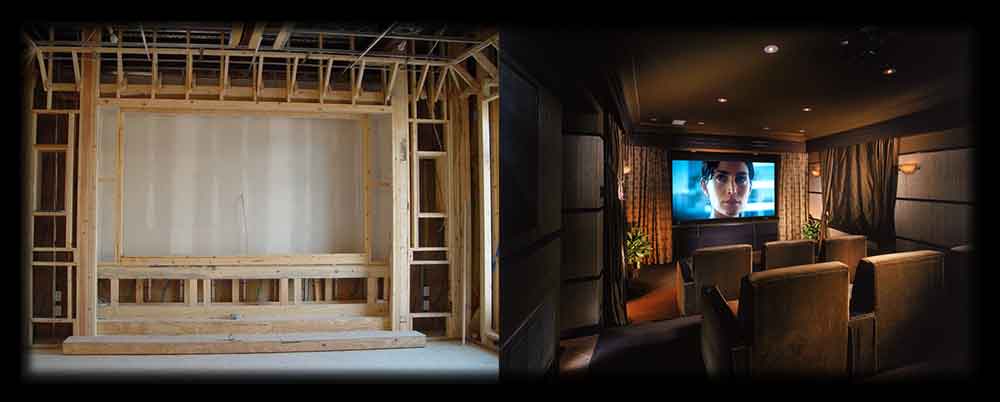Add Soundproofing Materials
Acoustiblok® Explains the Need for Soundproofing Materials
Add soundproofing materials to the walls, ceilings and/or flooring of your home theater or entertainment room to give your family and neighbors a better quality of life void of stress and anxiety caused by loud noise from movies, video games and television shows. Sound from home theater audio system speakers can exceed 100 decibels and higher. Without adequate soundproofing materials to absorb and mitigate it, the noise will travel through your wall, ceiling and floor joints and into the rest of the home.
Commercial cinemas give you a great acoustical experience that makes you feel like you are part of the movie. Commercial cinema-like sound is a key ingredient to any home theater or home entertainment room. It helps create a more memorable and pleasurable entertainment experience while watching high-speed car chases, fiery high-decibel explosions, and sweat-soaked vixens with machine guns.
Soundproofing In Your Home Provides a Higher Quality of Life
Sound travels in low-frequency waves. These waves radiate from the source of the sound in all directions. If the waves are met with resistance, they will redirect and dissipate. Because sound travels through walls, ceilings, floors and other surfaces as well as air, you will hear sound in virtually any environment.
Soundproofing is a difficult process. The only way to stop sound is to either reduce it or absorb it. Noise reduction works by blocking the passage of sound waves through either the use of distance or the placing or intervening objects in the sound path. On the other hand, noise absorption operates by transforming the sound wave itself. The wave changes when it comes into contact with certain materials.
For your home theater, you need to be aware of the amount of sound leaking from the room. Even though your home theater is smaller than a commercial movie theater, it should provide a good acoustical experience. Outside noises coming into the theater room need to be minimized and noise generated by your sound system needs to be kept inside your home theater walls so it does not disturb others inside and outside your walls.
If you are considering building a new home theater or home entertainment room, you may want to make sure soundproofing materials, like Acoustiblok, are in your construction tool box. Here’s why.
Soundproofing materials:
• Not only add essential mass to walls, ceilings or floors, but they also enhance the flexibility and stiffness while changing the natural resonance of the structure
• Drastically reduce sound transmission through your walls, ceilings and floors
• Keep high decibel noise in the theater room
• Allow people in your home to enjoy the home theater room or entertainment room any time of the day or night without disturbing others.
Various other building materials are available to help keep noise from escaping your home theater room and provide better quality acoustics such as sound panels, sound drapes, acoustic insulation, foam, carpeting or acoustic sound-deadening drywall.
Theater Room Acoustics and Intelligibility
Go to any movie theater and you will notice acoustic treatment covering a large percentage of the walls. Chairs are soft and well padded. The whole room has been carefully crafted to work as a single system.
In commercial movie theaters, acoustics plays a critical role in making sure that everyone can clearly hear the movie dialogue, no matter where they are seated. By eliminating near-wall reflections, those seated at the perimeter of the theater are not fighting to detect the sound from the speakers versus the sound reflecting off the walls. The padded seats are carefully designed to not only be comfortable, but also help control bass when not in use.

Add Soundproofing Materials


Home Theater Soundproofing
Add Soundproofing Materials – When a theater is properly treated acoustically, it improves our ability to comprehend what is being said and what noises are being heard. This is known as ‘intelligibility.’ The speech intelligibility in a room depends on the reverberation time and the background noise. If a room has a long reverberation time, spoken words will not die out before the next words reach the listener. This results in poor speech intelligibility. It will be difficult for the listener to understand what is said. However, if the sound is absorbed by acoustical soundproofing materials, it results in a short reverberation time. This provides a good acoustic environment and a high level of speech intelligibility.Standard drywall construction has what acousticians call a sound transmission class (STC) rating of 40 decibels; the higher the number, the better the material is at blocking sound. When you crank up your audio system to experience Johnny playing Guitar Hero at concert volumes, it’s easy to hit a very loud peak sound-pressure level of 110 decibels. A sound transmission class (STC) of 40 means a person on the other side of the wall will definitely hear Johnny jamming, and if you were to measure the volume with a sound meter, it would register about 70 decibels, which is loud enough to be bothersome.
Psychological Impacts of Noise on Our Family and Neighbors
One of the biggest culprits of home noise originates from home theaters that have poor acoustical features. According to Psychology Today website, noise is a stimulus, and when we have little control over the source, we often experience more stress and anxiety. Your anxiety may have several causes. First, you may have a “control” reaction, in which you are keenly aware of not being able to stop or alter a sound. Second, you may experience sound more sensitively than the average person. For those who notice sounds and get absorbed by it, the intrusion can become an interruption and a distraction from a productive task, including relaxation and sleep.
If you are a highly sensitive person in general, noise can be a powerful trigger to getting upset. Controlling our environment is a task humans are very good at, but in a modern world where noises are a part of the landscape, our control is limited. You can help control noise from your home theater or home entertainment room by using proper soundproofing materials.

